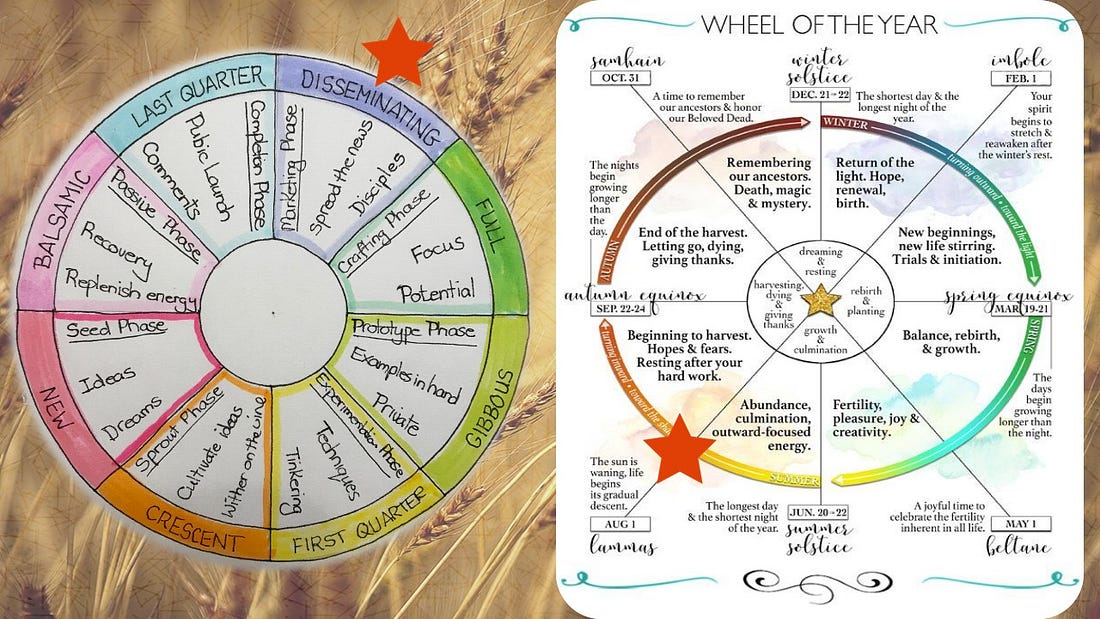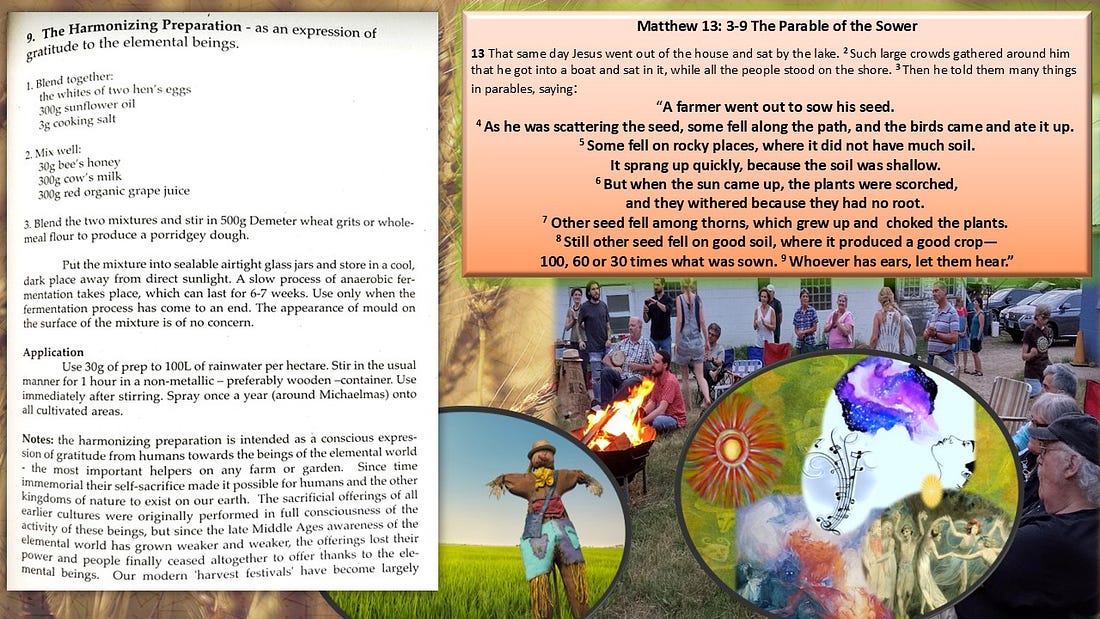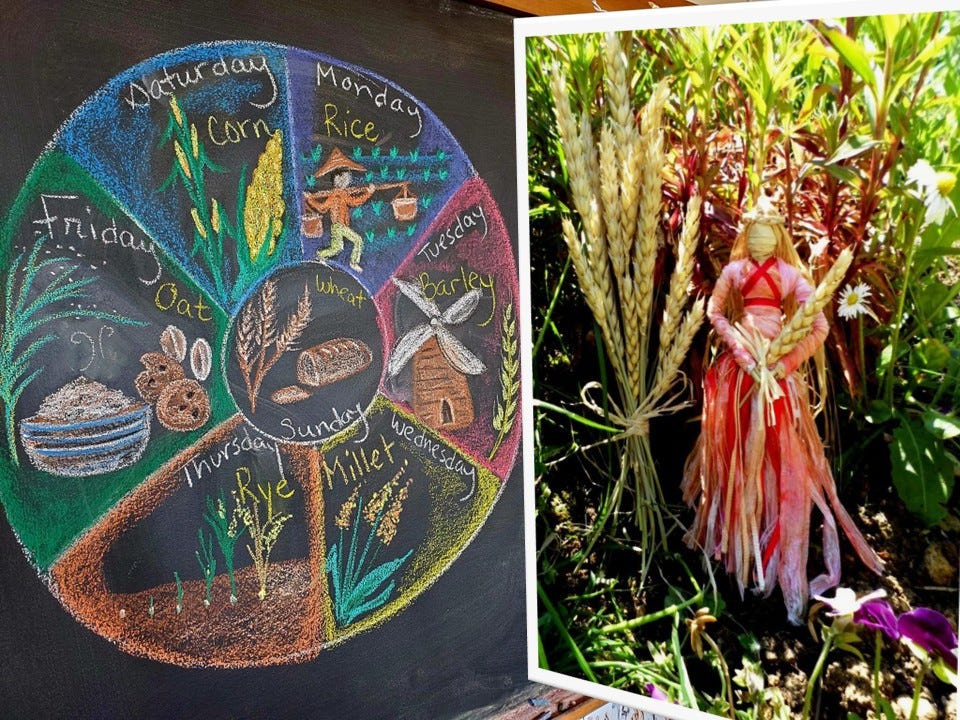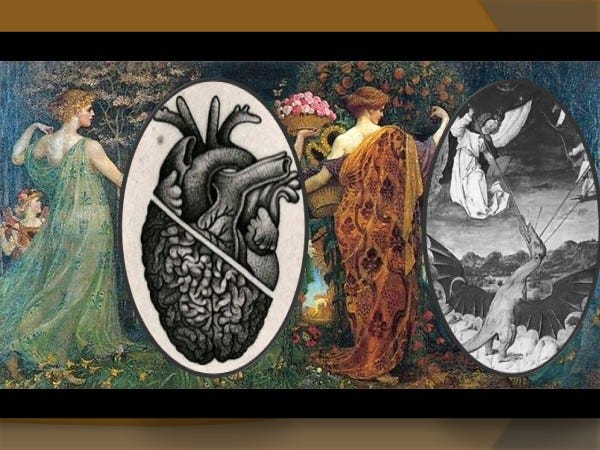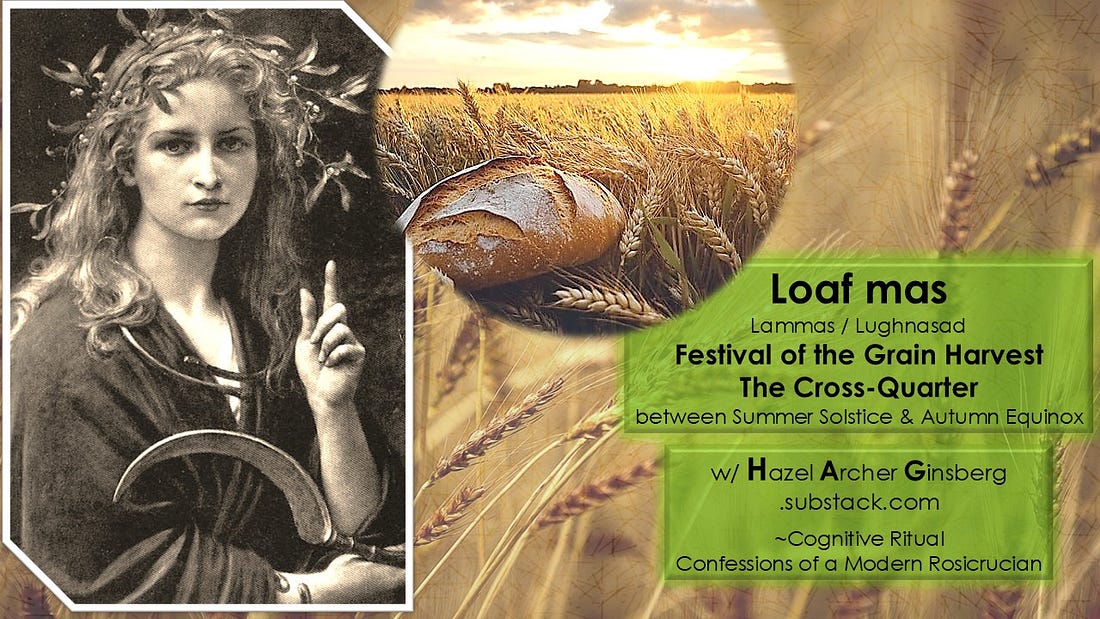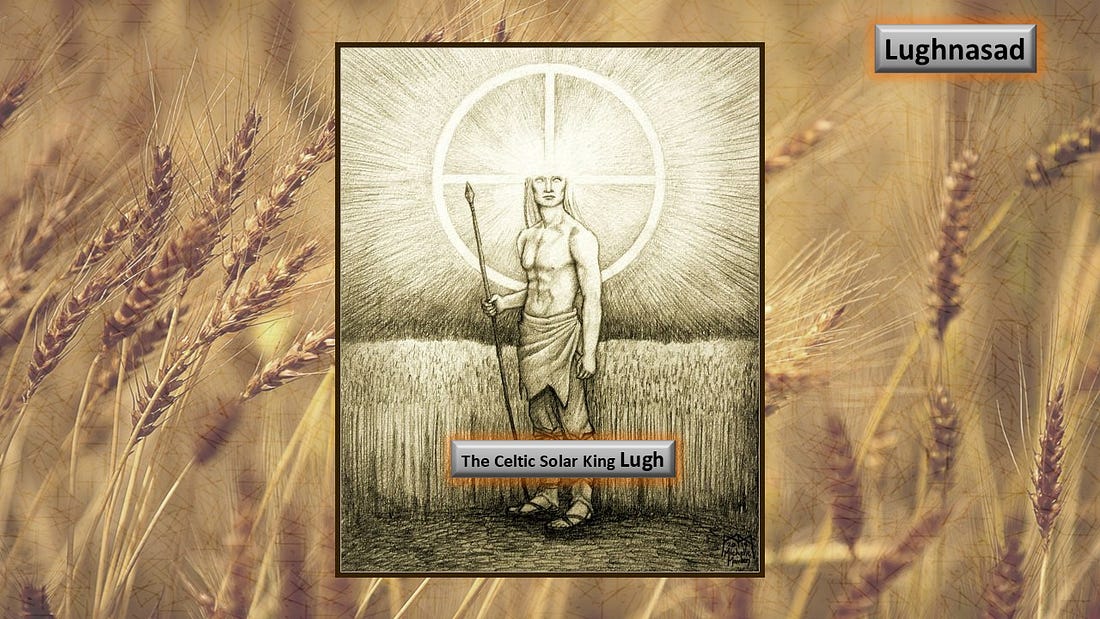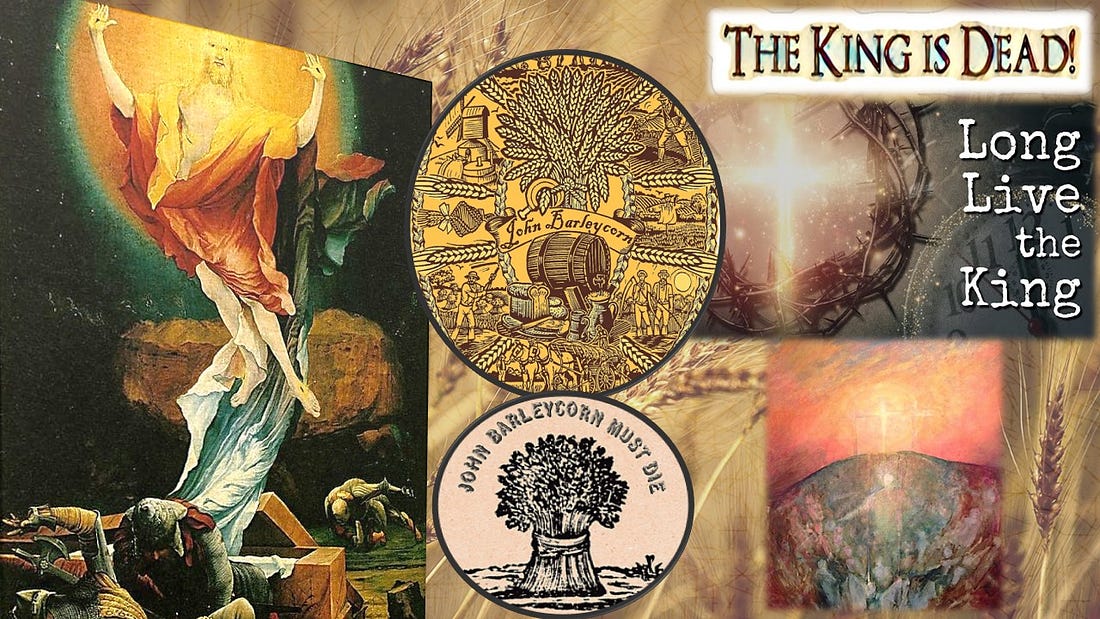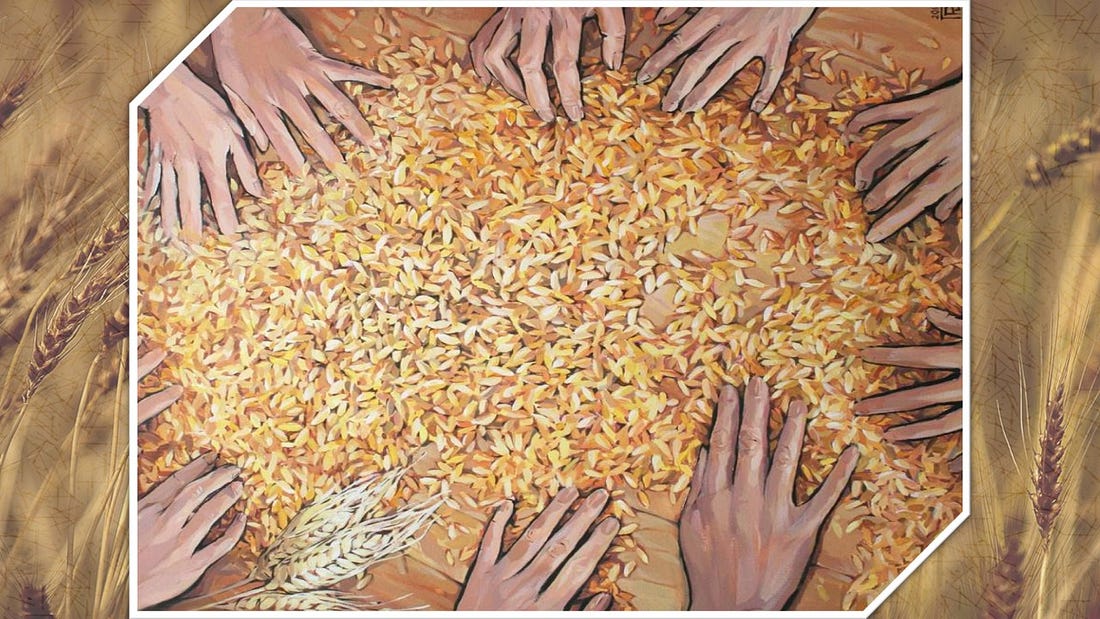Video Recording of this free Presentation1st installment of the Loaf mas CeresAt this Cross-quarter, the cycle of life turns past the peak of growth, into the time of release. In astrology, the moon, five-eighths past new on the way to full - is called the “disseminating moon”. During this phase, what has built up in the waxing cycle begins to be released into the environment. We start to see the results of our work. At Lammas, the Sun is five-eighths of the way around the Wheel from the Winter Solstice. Growth is reaching its peak, & the life of the Sun God has begun to bleed off into the fruit & grain. Just as the Sun goes into the grain, The cosmic light is ripening each of us - preparing us for the threshing floor… Learning from the yield - gathering in - We Self-harvest So even as we take in the bounty from the fruits of the Earth to nourish our bodies, we become the spiritual fruit that will sustain the World-Soul … We can consciously store up the essence of the Summer of Sun within us - as Soul-strength. We digest the comic Summer expansion now, in memory – looking with a discerning eye - with appreciation, & compassion - at our current crop…Asking: Am I, a fit food for the gods? Am I ripening well? Am I Feeding – Am I being fed? And really, in essence – this is the time to ponder the mystery of the wheat = That which dies - will live again - That which is cut down – will rise again - Like the Sun- Who will rise again? We will rise again And Yes, like John Barleycorn we are sure to fall - in his case into the evils of indulging in too much alcohol – another by-product of the grain harvest – the opposite of the staff of life - the crutch of alcohol – So, yes, there are dark aspects to this Festival which is meant to lead us into the dark half of the year – So perhaps this is why there is a negative modern connotation to the ritual burning the ‘Wicker Man’ - equating it with human sacrifice – a false rumor stared BTW by Julius Ceaser when he sought to conquer the Druids - So interesting how ancient rituals, depicted thru malicious materialistic thinking, become horror movies – a debasement, making a mockery of what was purely an offering of thanksgiving by the people who lived in accordance with the Cycle of the Seasons. The practice of making an offering of gratitude for a bountiful harvest is part of our human heritage - & Yes, it’s true that every impulse from the past has become degraded if it is not consciously reclaimed & renewed - & that yes, human sacrifice is a corrupted debauchery of those earlier impulses, a confused materialistic Black-Magic overlay of what the true concept of a Free-will Sacrifice is meant to be – exemplified by the Christ event. Our community will be making a Scarecrow – a Straw-Man or ‘Wicker Man’, if you will – during our Lammas Festival at Zinniker Farm – to give thanks for the biodynamic grain, especially the Pfeiffer Wheat grown on that sacred land – along with singing together w/ UVA, & making an offering of the Harmonizer Preparation as a gifting to the Elementals & the Spirit of the Land – We will contemplate the parable of the Sower - & the feeding of the 5000 as well. I envision this building of a human figure filled with straw, as a symbol of the Sun-force that fills the human being with vitality & light - In fairy tale, straw is spun into gold – symbol of the Sun. So by co-creating our own Straw-Man, we are committing an act of community service that encourages us to set intentions, to offer reverence, garner good will, alongside any need to acknowledge grief, or loss - a creative way of facing ourselves – a true accounting of what we have sown – ‘They shall know you by your fruits’ The Harvest Festival of Lammas, is about stepping up to do the inner work needed to manifest, & preserve, what feeds our body, mind & soul. Tune in tomorrow for another Lammas installment, watch the recording & come join us on the Farm xox ~hag 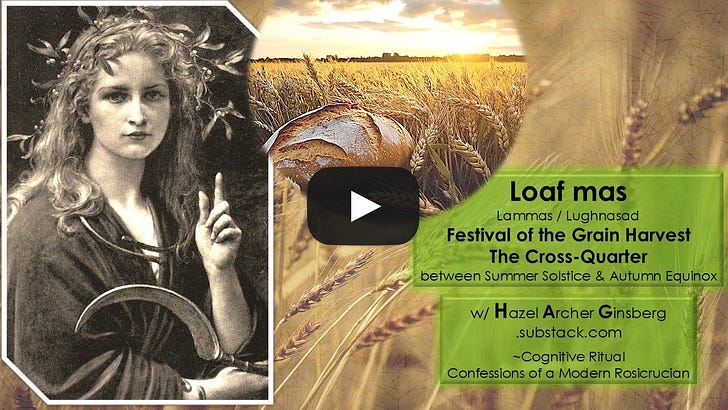 Saturday 2 August 2025Lammas Festival on Zinniker Farm3 pm - Gather for the Harmonizer Prep Stir – & gifting to the Elementals & the Land5 pm – Seasonal Activities w/ Ultra-Violet Archer & FriendsBonfire – Make & burn the ‘wicker man’ / Parable of the Sower / Song Circle w/ Garrett & UVA…6 pm - Potluck dinner$30 Donation31 July 2025 - “Speaking with the Stars” If you want to support the Biodynamic Farming done on Zinniker Farm, you are invited to become a paid subscriber, with all donations going directly to the farm Greetings Friend, you currently a free subscriber to Cognitive Ritual. Thank you for receiving my workings freely offered. For the full experience, upgrade your subscription. ALL donations go to support Zinniker Farm - The oldest Biodynamic Farm in America! Together we can spiritualize the Universe. XOX ~hag |
Thursday, 31 July 2025
Self-Harvest
Wednesday, 30 July 2025
Pick up the Scythe
And so it is - that the Wheel of the year turns from the height of Summer Solstice with its dreamy cosmic expansiveness, past St. John’s Tide with its Call to Conscience – to meet now at the Cross-Quarter – the half way point between Summer Solstice & the Autumnal Equinox - marking the point on the wheel when we pick up the Scythe - to reap what we have sown - for now begins the Festival Season called by folklore: Lammas, Loaf mas, or Lughnasad which means: Assembly of Lugh – a festive gathering hosted by the Celtic Solar King: Lugh – representing the Sun that has gone into the grain. He calls the people together for the funeral games—to commemorate the death of his foster-mother Tailtiu, an earth goddess, who embodies the dying vegetation that feeds humankind. A role that he now takes on. It was also the wake for the death of Summer – the end of the milk & honey season & the beginning of the harvest toil. The harvest is: the sacrifice of Lugh - the Sun God is cut down, to become our bread From death comes the Staff of Life – The staff of Life baked into bread – Bread is like the cosmic love child born from the union between Sun & Earth - for the loaf takes the gift of Nature further – it involves the fruits of human labor. Grain is crafted by human hands - combined with the 4 elements - to rise up as bread & Some of the first fruits are ready for harvest, but some, too immature to be eaten, must be culled – removed – fed to the animals or the compost - so they won’t drain the life-force away from the good fruit. If everything was left on the tree, the vitality would be weakened, or worse, the bad fruit could weigh the branch down until it breaks, destroying the entire crop, or sometimes killing the tree. The culls are taken so the good fruit, & those who depend on the crop for survival, might live. The King is Dead Long Live the King – This is the essence of the grain harvest sacrifice - for now begins the Season of death in service of life. Even though the Sun is still hot for the ripening, it has been decreasing since St. John’s – the shadows are lengthening as we make our descent toward the dark half of the year. One of my favorite Irish folk songs says it all: ‘John Barleycorn must die’…There are many versions, with tons of verses, the band Traffic made it popular in the 70’s – it describes in anthropomorphically gory detail the process of barley becoming bread & beer - John Barleycorn is Cut down – Winnowed well – beaten with sticks as the folk-song goes - to separate the wheat from the chaff - crushed by the mill-stone – etc. & so we see that "John Barleycorn" is an allegory of the passion of the Christos. And just like the Christ, the grain will rise again within us. ~hag Saturday 2 August 2025Lammas Festival on Zinniker Farm3 pm - Gather for the Harmonizer Prep Stir – & gifting to the Elementals & the Land5 pm – Seasonal Activities w/ Ultra-Violet Archer & FriendsBonfire – Make & burn the ‘wicker man’ / Parable of the Sower / Song Circle w/ Garrett & UVA…6 pm - Potluck dinner$30 Donation30 July 2025 - “Speaking with the Stars”: The Delta Aquariids Meteor Shower peaks TODAY ON THIS DAY IN HISTORY 1894- Birthday of Ernst Lehrs a German anthroposophist, science teacher in the 1st Waldorf School in Stuttgart, lecturer & writer. Having fought in World War I, he then studied science & graduated with a PhD in 1923. In 1935 he moved to The Netherlands, where he worked as a teacher, before moving to Britain as a Jewish refugee from the Nazis. In 1952 he returned to Germany & worked as a lecturer at the newly established course in anthroposophic special education in Eckwälden, where he remained until his death. In his important work “Man and Matter”, Ernst Lehrs talks about how today’s researcher is an uninvolved spectator, he reveals not only how science has led inescapably to the illusions it believes in today, but more important how we may correct in ourselves the misconceptions science brings into our views through today’s education, giving us a spiritual understanding of nature based on the work of Goethe; which requires an activation of the cognitive consciousness, leading the true researcher back to themselves. Ernst Lehrs was a personal pupil of Dr. Rudolf Steiner, one of the 12 founding members of the Esoteric Youth Circle, which celebrated its 100 year anniversary on 16 October 2022. Written by Ernst Lehrs a few days after the burning of the 1st Goetheanum: “ Dr. Steiner’s open criticism in various directions concerning the Society & the various activities within it, in the weeks leading up to the fateful Christmas-New Year’s time, made one clear about the fact that it was due to the failure on the part of the Society, that the necessary spiritual protection was missing from the building. Yet, it was out of an experience of this failure that the impulse for the Youth Course arose, as well as what led to the coming about of our specific endeavor - The Esoteric Youth Circle Meditation. ~Ernst Lehrs (CW266/3 part 3) If you want to support the Biodynamic Farming done on Zinniker Farm, you are invited to become a paid subscriber, with all donations going directly to the farm The Cognitive Ritual is a Free Will Offering to All worlds. Please Share freely Greetings Friend, you currently a free subscriber to Cognitive Ritual. Thank you for receiving my workings freely offered. For the full experience, upgrade your subscription. ALL donations go to support Zinniker Farm - The oldest Biodynamic Farm in America! Together we can spiritualize the Universe. XOX ~hag © 2025 Hazel Archer-Ginsberg |
-
https://youtube.com/watch?v=IlPponrElbc&si=5ds0UtFazsvr-lFf ...


